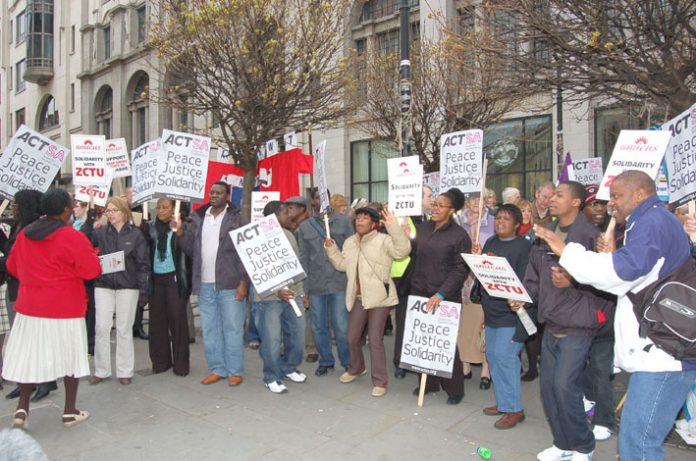
SOUTH Africa’s trade union federation COSATU has said the deal signed on Monday by Zimbabwe’s political rivals ‘marks a dangerous spread of the Kenyan virus,’ that sends a message to dictators that they can defy the will of the people.
The Zimbabwean deal will see Robert Mugabe remain as President, while winner of the March presidential elections, MDC leader Morgan Tsvangirai, will become Prime Minister.
The Zimbabwe Electoral Commission declared that Tsvangirai had not won by a large enough majority in the March poll – signaling an upsurge in politically motivated violence against MDC supporters in the run up to the highly disputed run-off vote.
A similarly violent situation in post election Kenya saw a government of national unity being formed – a government that the Zimbabwean power sharing deal has been widely compared to.
COSATU said in a statement on Wednesday that the signed agreement marks a retreat from the principles that the African Union and Southern Africa Development Community are supposed to uphold, and a ‘return to the bad traditions of the Organisation of African Unity, that sacrificed the interests of the people to protect dictators.’
The federation said it gives the deal ‘cautious support,’ adding it was awaiting comments from the Zimbabwe Congress of Trade Unions as ‘it is only the people of Zimbabwe who must judge whether or not this deal is in their interests.’
COSATU’s national spokesperson, Patrick Craven, said on Wednesday that it is important that Zimbabweans ‘are the judges of the deal,’ but added that the federation is gravely concerned that certain demands have not been met.
Craven explained that the deal ‘does not reflect the March elections’ in that the MDC has a ‘more junior role to that of ZANU PF.’
He also expressed concern that a ‘draconian legislation is still in force,’ which could see opposition leaders remain targets of violence and arrest.
Craven argued that these concerns are based on the demands made by civil society, and said at the ‘heart of our worries’ is that the public will is still being ignored.
He said this sets a bad precedent for the future of the Zimbabwean government, as the will of the people urgently needs to be enforced.
Craven added that Kenya, with its government of national unity, ‘set a very bad example’ in that there is a ‘shifting back’ to a situation where African leaders can turn their backs on atrocities being committed in their neighboring countries.
COSATU also said in Wednesday’s statement that it would wait for the go ahead from the Zimbabwe Congress of Trade Unions before continuing with the proposed programme of boycotts, saying ‘if they ask us to proceed we shall do so.’
The trade union federation had organised a mass boycott of goods headed for Zimbabwe as a form of protest against Mugabe’s continued term as President after the run-off election in June.
Meanwhile, a Harare magistrate has granted the Zimbabwe Congress of Trade Unions (ZCTU) leaders’ the right to have their Constitutional case heard at the Supreme Court.
This is after the two leaders, President Lovemore Matombo and Secretary-General Wellington Chibebe, who are facing allegations of ‘communicating falsehoods prejudicial to the State’ and ‘inciting the public to rise against the government’, said the law under which they are being charged, the Criminal Law Codification Act, infringed on their right to freedom of expression as enshrined in the Constitution of Zimbabwe.
Because of the constitutional challenge, the magistrate had no option other than to remand the leaders to December 5th, 2008 to give time to the Supreme Court to make decision.
At the beginning of the trial yesterday, ZCTU’s lawyer, Mr Aleck Muchadehama, had applied to have the case exempted from the trial, but this was rejected by the magistrate.
In his reasons for the rejection given today, the magistrate said he was of the opinion that the two were properly charged under the law.
However, he said he found the ZCTU application to the Supreme Court on the grounds of freedom of expression was not ‘frivolous and vexatious’ as alleged by the State and therefore, he referred the matter to the Supreme Court.
In his arguments, Mr Muchadehama submitted that the two ZCTU leaders were arrested for expressing themselves and that they had only received the information and itcommunicated to the workers.
He said the ZCTU leaders had a right to receive and impart information under the Constitution of Zimbabwe and that the Criminal Law Codification Act did not conform with the Constitution.
However, the State, through chief law officer, Mr Tawanda Zvakare, contends that the two ZCTU leaders told the workers that they had received the information that ZANU PF supporters had killed two teachers at a school in Guruve before urging them to take revenge, an allegation denied by the ZCTU leaders.
The State claims that the information was false and calculated to incite workers to revolt against the government.
The ZCTU leaders are on Z$20 billion bail that was granted by the High Court on 19 May 2008 following their arrest at Dzivaresekwa Stadium while addressing workers on Workers Day, May 1st, 2008.
As part of the conditions for granting bail, the two are being barred from addressing any political gathering until this matter is finalised.
They were also ordered to reside at their given home addresses and not to interfere with any state witnesses.